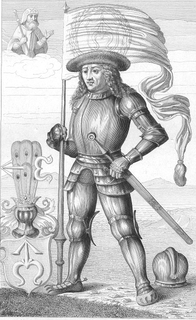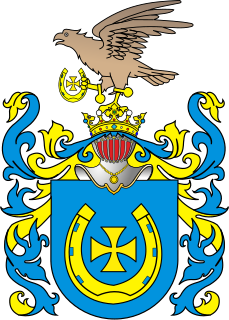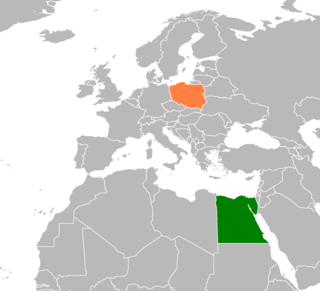Wincenty Konreli Feliks Szweycer (born 6 April 1810 in Wola Chynowska, d. 6 June 1872 in Chociwie) was a Polish noble ( ziemianin ), an owner of Rzeczyca, participant of November Uprising and January Uprising.

Wola Chynowska is a village in the administrative district of Gmina Chynów, within Grójec County, Masovian Voivodeship, in east-central Poland. It lies approximately 1 kilometre (1 mi) south of Chynów, 16 km (10 mi) east of Grójec, and 36 km (22 mi) south of Warsaw.
Polish landed gentry was a social group or class of hereditary landowners who held manorial estates. Historically, ziemianie consisted of hereditary nobles (szlachta) and landed commoners. The Statutes of Piotrków (1496) restricted the right to hold manorial lordships to hereditary nobility. The non-nobles thus had to either sell their estates to the lords or seek a formal ennoblement for themselves, or had their property taken away. A rare exception was the burgesses of certain specially privileged "ennobled" royal cities who were titled "nobilis" and were allowed to buy and inherit manorial estates and exercise their privileges and monopolies. Therefore, in the szlachta-dominated Polish–Lithuanian Commonwealth there was almost no landed gentry in the English meaning of the term, i.e. commoners who owned landed estates. With the Partitions these restrictions were loosened and finally any commoner could buy or inherit land. This made the 20th-century Polish landed gentry consist mostly of hereditary nobles, but also of others.

Rzeczyca(listen) is a village in the administrative district of Gmina Ulhówek, within Tomaszów Lubelski County, Lublin Voivodeship, in eastern Poland, close to the border with Ukraine. It lies approximately 3 kilometres (2 mi) west of Ulhówek, 24 km (15 mi) east of Tomaszów Lubelski, and 122 km (76 mi) south-east of the regional capital Lublin. The village is located in the historical region Galicia.
Wincenty was born on 16 April 1810 in Wola Chynowska. [1] He was son of Ludwik (1776-1835), an heir of Wola Drzazgowa, and Marianna de domo Piwor (1782-1842). [1]
He died suddenly on 6 June 1872 in Chociwie, where he visited his friend Jan Nepomucen Jaśkowski. [1] Wincenty Szweycer was buried in Rzeczyca. [1]
Jaśkowski dedicated him a poem Na śmierć Wincentego Szwejcera w Rzeczycy. [1]
Adam Hieronim Sieniawski was a Polish noble

Marek Sobieski was a Polish nobleman, starosta of Krasnystaw and Jaworów, and the older brother of King John III Sobieski of Poland. He graduated from Nowodworek College in Kraków and Kraków Academy, then traveled and studied in Western Europe. After returning to Poland in 1648 he fought against the Cossacks and Tatars at the Siege of Zbaraż and at the Battle of Beresteczko. He was taken captive by Tatars in 1652 and then killed by Cossacks.

Elżbieta Szydłowiecka was a Polish–Lithuanian Calvinist noblewoman heiress.

Spytek of Melsztyn was a Polish nobleman (szlachcic) of the Leliwa coat of arms.
Tadeusz Synowiec was a Polish soccer player, midfielder and forward, later a coach and journalist, graduate of Kraków’s Jagiellonian University.

Pniewo is a village in the administrative district of Gmina Łomża, within Łomża County, Podlaskie Voivodeship, in north-eastern Poland. It lies approximately 11 kilometres (7 mi) south-east of Łomża and 65 km (40 mi) west of the regional capital Białystok.

Jakub Szydłowiecki was a Polish nobleman and politician. In the years 1493-1501 he was Burgrave of Kraków and was a courtier of the king from 1496, Treasurer of the Crown Court in 1497, Grand Teasurer of the Crown from 1501 to 1506, and castellan and starost of Sandomierz, Sochaczew and Łęczyca.
Justynian Niemirowicz Szczytt was a Polish nobleman (szlachcic), a chamberlain (podkomorzy) of Polotsk and a deputy to the sejm (parliament) of the Polish–Lithuanian Commonwealth.

Niemirowicz-Szczytt was a noble Polish family. It used Jastrzębiec coat of arms. They also used another forms of surname like Niemirowicz-Szczyt, Szczytt-Niemirowicz, Szczyt-Niemirowicz, Szczytt or Szczyt.
Krystyn Szelejewski was a Polish nobleman and the castellan of Krzywiń.
Jan Swołyński was a Polish nobleman (szlachcic) and a marshal (marszałek) of Oszmiany.
Ferdynand Jakub Obtułowicz was a Polish hygienist doctor, a social worker, the president of Towarzystwo Higieniczne in Lwów, a member of council of Lwów.
Adam Ostrzycki also Adam Ustrzycki, Adam Jan Ustrzycki was a Polish szlachcic (nobleman), marshall of army's confederation in 1665-1666.
Teodor Szybiłło was a Polish politician and member of the Legislative Sejm (1919-1922).
Ścibor z Gościeńczyc was a Polish Roman Catholic priest and the bishop of Płock since 1463.
Piotr I was a Roman Catholic priest and bishop of Wrocław.
Odolan was a Polish nobleman. During the reign of Bolesław III Krzywousty He was probably comes of Poznań or Gniezno. After his death supported his younger sons against his oldest son Władysław II Wygnaniec. Odolan was probably wojewoda of younger sons of Bolesław III.

Egypt–Poland relations refers to the relationship between Egypt and Poland. Egypt has an embassy in Warsaw whilst Poland has an embassy in Cairo.
This page is based on this
Wikipedia article Text is available under the
CC BY-SA 4.0 license; additional terms may apply.
Images, videos and audio are available under their respective licenses.







